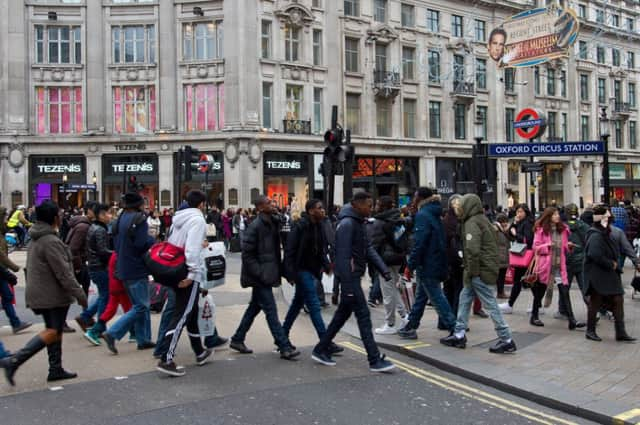Falling prices encourage consumer spending


The latest monthly Spending Power Report by Lloyds Bank, published today, showed lower energy and petrol prices had helped push its index to the highest level since it was launched in 2001.
Those polled said they were also more positive about the state of the UK economy, employment and inflation levels, and their own financial security.
Advertisement
Hide AdAdvertisement
Hide AdHowever, they were less positive about the economic outlook than last month. Scotland was below the index’s UK average of 154 last month, at 148. London was the most confident region, at 171, with Northern Ireland the least, at 126.
The report found people were spending almost 1 per cent less on essentials than they were a year ago. This included nearly 8 per cent less on gas and electricity, and almost 9 per cent less on petrol and diesel, thanks to falling prices.
More than half of the 2,000 people surveyed said they had cut back on spending since the start of the year as they recovered from the impact of Christmas on their budgets. One in four had used a cheaper supermarket in their quest to rein in spending, and more than one in five had used more voucher codes or discount websites.
One in ten had sold more items on auction websites, perhaps offloading unwanted Christmas presents.
Four out of five said that they had money left after paying for essentials. They said they had spent nearly half of their leftover cash, put almost a quarter into savings and used 14 per cent of it to pay off debt. Last month, inflation fell to its lowest level since records began 26 years ago amid low oil prices and fierce supermarket competition.
The Consumer Price Index (CPI) measure of inflation came down from 0.5 per cent in December to 0.3 per cent in January. It is expected to be cut further in the coming months.
Lloyds Bank chief economist Patrick Foley said: “An easing in price pressures for fuel and utilities, and a more positive view of employment conditions, have produced an upbeat mood among households at the start of the year. While some caution remains around future income prospects, with inflationary pressures likely to remain in check and some pick-up in pay growth now emerging, households should continue to feel better off through 2015.”
However, an analyst said the low rate of wage rises in Scotland outweighed the impact of fuel price savings.
Advertisement
Hide AdAdvertisement
Hide AdDavid McCorquodale, head of retail at KPMG, said: “The reality is the extra money that might be around has come from petrol and other fuel price deflation.
“An extra £10 in the tank might make people feel better, but it’s not going to find its way back to increased spending on the high street.
“To really drive consumer confidence, you need wage rate inflation, and that has not happened in Scotland yet.
“We are still in a low-growth environment and are acclimatising ourselves to it.”
David Martin, director of the Scottish Retail Consortium, said: “This report mirrors much of what our own evidence is telling us about consumer confidence and essential spending.
“It is clear many of us have become comfortable with value and looking to reduce unnecessary costs. This has resulted in fierce competition in the retail sector, not least amongst the major grocery retailers who have been working incredibly hard to insulate households from rising prices.”
FOLLOW US
SCOTSMAN TABLET AND MOBILE APPS